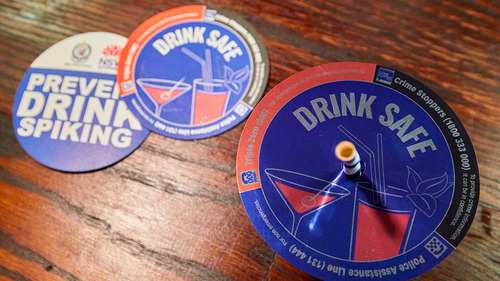The NSW Police Force has expanded its ‘Drink Safe’ campaign with the introduction of drink covers and coasters to support and promote safe drinking at licensed venues across the state.
Developed and launched by the Crime Prevention Command, ‘Drink Safe’ aims to educate the community about safe drinking behaviours and highlight tips to mitigate potential risks to personal safety.
A key element of the campaign is education in relation to drink spiking, a crime that has been of concern to industry and consumers alike for decades.
To build on the education packages, police are rolling out a trial of drink coasters and single-use self-adhesive drink covers to NSW licensed venues, with priority to licensed venues within the Sydney WorldPride precinct.
The covers and coasters depict an anti-drink spiking message and are designed so patrons can get up and dance or socialise without fear of their drink being spiked.

The drink covers include instructions for use and are manufactured in a recyclable food safe material which is compliant with the Plastic Reduction and Circular Economy Act 2021.
Corporate Sponsor for Alcohol-related Crime, Assistant Commissioner Brett McFadden, said police treat all reports of drink spiking seriously, as it can be a precursor for something more sinister.
“In cases where a drink is spiked and another indictable offence occurs, such as sexual assault, the offence rightfully carries a much higher penalty,” Assistant Commissioner McFadden said.
“For those who think they can slip something in someone’s drink and take advantage of them, they should know they could spend the next quarter of a century behind bars.”
He said similar measures have been used successfully overseas and police hope to see a positive impact in terms of reduced incidents and reports of suspected drink spiking and increased conversation in the community – particularly among patrons – against dangerous drinking behaviours.
Drink or food spiking is a criminal offence, and, in NSW, it carries a maximum penalty of two years imprisonment and/or an $11,000 fine.
Section 38 of the Crimes Act, ‘using intoxicating substance to commit an indictable offence’ carries a maximum penalty of 25 years imprisonment.
“The priority for anyone who suspects their drink had been spiked is to seek urgent medical assistance and in a life-threatening situation, contact Triple Zero.”
“In cases where the victim has also been taken somewhere without their knowledge, I encourage them to get to a safe place and call the police immediately.
“For all other instances, make a police report as soon as possible. It is vital for investigators to start gathering evidence quickly, so they can track down the person/s responsible before they harm someone else,” Asst Commissioner McFadden said.

In NSW, police have seen an increase in reports drink spiking, however, the number of actual drink spiking incidents remains low.
Asst Commissioner McFadden said there was no single typical example of a drink spiking, nor a pattern to indicate how and when it may occur.
“The commonality of incidents reported to police is that victims find it difficult to recall the events of the night and the effects they experience are not consistent with the number of drinks consumed,” he said.
“While cases of drink spiking using drugs such as benzodiazepines, GHB or ketamine are rare – the most common type of spiking is with alcohol – the majority of reports come after the victim has been in a social setting where alcohol is consumed.
“We know that the most effective ways to reduce the chances of your drink being spiked are to keep an eye on your drink and never accept drinks from people you don’t know well or trust.
“These coasters and covers can help with keeping drinks safe and importantly, they’re a conversation starter – hopefully raise awareness of the issue and keep it at top of mind.”
More information about DrinkSafe, including facts about drink spiking, is available on the NSW Police Force website.



